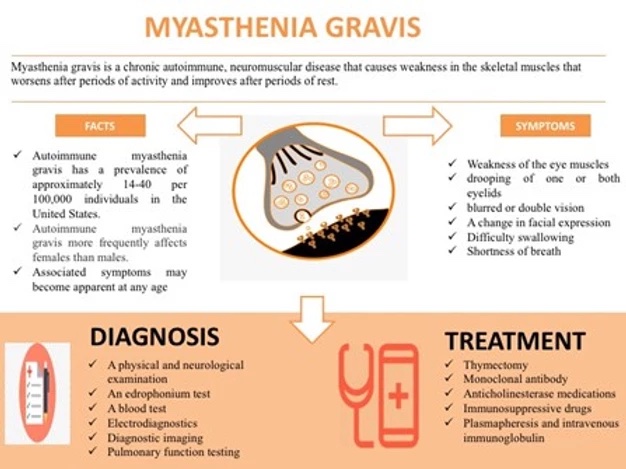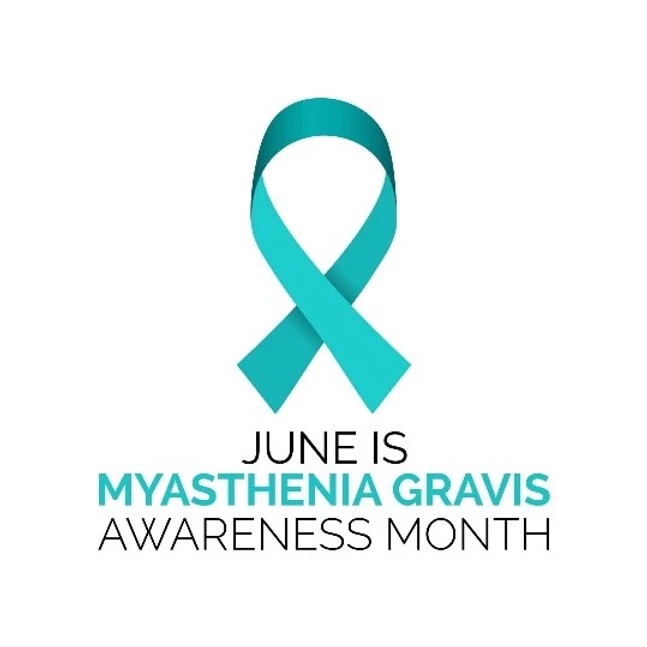The month of June is Myasthenia Gravis (MG) Awareness Month! At ValedaRx, we wanted to take some time to help others understand some of the challenges faced by those in the MG community and what we may be able to do to help. The Myasthenia Gravis Foundation of America is changing the theme from Awareness Month to MG Action Month, “turning awareness into action”. They are finding creative ways to show that “We are much more than our MG”. Join in on the action this month by using #MGStrong!
Myasthenia Gravis is an autoimmune disease which means that the body’s immune system attacks its own tissues. In patients with MG, this attack interrupts the connection between the nerves and muscles causing weakness and rapid fatigue of muscles. This condition usually becomes apparent during adulthood, but symptom onset can occur at any age.
The condition may be restricted to certain muscle groups, particularly those of the eyes (ocular myasthenia), or may become more generalized (generalized myasthenia gravis). The latter case involves multiple muscle groups. Most individuals with MG develop weakness and drooping of the eyelids, weakness of eye muscles, and excessive muscle fatigue following activity. Additional features commonly include weakness of facial muscles, double-vision, impaired speech, difficulties with chewing/swallowing, and weakness of the upper arms and legs. In addition, in about 10% of MG patients, affected individuals may develop potentially life-threatening complications due to severe involvement of muscles used during breathing, which is known as a “myasthenic crisis”.
Some quick facts about MG:
· It is estimated that 20 in 100,000 people have MG.
· It can occur regardless of age, race, or gender.
· It is not believed to be a commonly inherited disorder and is not contagious.
· It cannot be transmitted via any form of direct contact.
· There is no known cure, but there are many effective treatments that can make managing life with MG easier.

The actual cause of MG is not well understood and may be due to one of several underlying issues with the immune system. With MG, your immune system produces compounds called antibodies that block or destroy many of your muscles’ receptor sites for an important neurotransmitter called acetylcholine. Acetylcholine is a chemical that your body produces that helps to facilitate the process of movement by conducting nerve signals. With fewer receptor sites available, your muscles receive fewer nerve signals, which in turn results in increased weakness. In some patients MG may be due to issues with the thymus gland. This gland is a part of your immune system and is located in the upper chest region beneath your breastbone. Research suggests that the thymus triggers or maintains the production of the antibodies that block acetylcholine. The thymus, which is typically large in babies, is small in healthy adults. In some adults with MG, however, the thymus gland is abnormally large. Some people with MG also have tumors of the thymus gland (thymomas) that are usually not cancerous.
If your physician believes that you may have MG, they will likely assess your symptoms, review your medical history, and conduct a physical examination. Routine tests may be performed as well including nerve conduction studies where your physician will send small pulses of electricity through the electrodes to measure the nerve’s ability to send a signal to your muscle. To diagnose MG, doctors will test the nerve repeatedly to see if its ability to send signals worsens with fatigue. Alternatively, your physician may collect a blood sample and perform a test which will assess for the presence of abnormal antibodies that disrupt the receptor sites where nerve impulses signal your muscles to move.
In terms of treatment options, there are no curative treatments available yet but there are several exciting investigational drugs that are currently in development. However, there are various treatments that, either alone or in combination, can relieve symptoms of MG. Your treatment will depend on your age, the suspected cause of your MG, as well as how severe your symptoms are. Treatment options include oral and/or intravenous medications as well as surgery to remove the thymus.

Commonly used oral medications to treat chronic symptoms:
· Cholinesterase inhibitors. Medications such as pyridostigmine enhance communication between nerves and muscles. These medications are not a cure, but they can improve muscle contraction and muscle strength in some people.
· Corticosteroids. Corticosteroids such as prednisone inhibit the immune system and limit antibody production.
· Immunosuppressants. Your doctor might also prescribe other medications that inhibit the immune system, such as azathioprine, mycophenolate mofetil, cyclosporine, methotrexate or tacrolimus.
Commonly used intravenous therapies to treat sudden or short-term worsening of symptoms:
· Plasmapheresis. Your blood is sent through a machine that removes the antibodies that block transmission of signals from your nerve endings to your muscles’ receptor sites. However, the positive effects usually last only a few weeks, and repeated procedures can lead to difficulty accessing veins for future treatments.
· Intravenous immunoglobulin (IVIg). This therapy provides your body with normal antibodies, which alters your immune system response. Benefits are usually seen in less than a week and can last 3 to 6 weeks.
· Monoclonal antibodies. Rituximab (Rituxan) and the more recently approved eculizumab (Soliris) are intravenous medications for MG. These drugs are usually reserved for people who do not respond to other treatments.
If you or a loved one has been recently diagnosed with MG, we recommend reaching out to both local and national support groups for patients with MG. These support groups can connect you with other patients with MG as well as a network of providers who are there to provide the highest quality of care and increase each patient’s individual quality of life. The largest national support group is the Myasthenia Gravis Foundation of America which provides a nationwide network for connecting patients with MG, resources for improving access to medical care, and support for promising research. Locally, those with MG can reach out to the Myasthenia Gravis Association of Western Pennsylvania to access local services and to become more involved in their local community.
Additional details for both of these groups can be found below:
Myasthenia Gravis Foundation of America www.myasthenia.org/
Myasthenia Gravis Association of Western Pennsylvania www.mgawpa.org/
Though there is currently no cure for MG, there are many medical and lifestyle interventions that can be made to manage your symptoms and increase your quality of life. We at ValedaRx are thankful to be a part of the support network for our patients with MG. As a member of your healthcare team, we will continue to work directly with your healthcare providers to provide unmatched personalized care and treatment that enhances the quality of life for all those living with MG as well as their families and loved ones.
